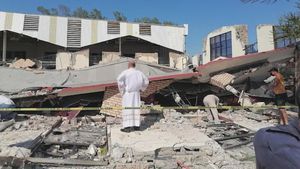The Trump administration has made the controversial move to withdraw almost all U.S. Agency for International Development (USAID) workers from their posts worldwide, effectively dismantling decades of American efforts to provide humanitarian aid and support development globally. Announced on Tuesday, this policy shift signals the end of what had been known as America’s commitment to combat starvation, improve education, and address the epidemic of infectious diseases across the globe.
According to reports from the Associated Press, the administration's decision follows the recommendations of political appointees from Donald Trump's first term and teams led by billionaire Elon Musk, who label much of this foreign spending as wasteful. The drastic order is set to take effect before midnight this Friday, compelling overseas USAID staff, many of whom were already preparing for this outcome, to return home within 30 days—unless they are classified as 'essential' workers.
Contractors also face termination if they are not deemed necessary for operations. USAID has witnessed significant layoffs and program closures over recent months due to the Trump administration's sweeping freeze on foreign assistance. This freeze paralyzed U.S.-funded aid work globally, impacting health programs pivotal to fighting diseases like polio and HIV/AIDS.
The U.S. remains the largest humanitarian donor worldwide, allocating less than 1% of its total budget on foreign assistance. This reduction in aid will jeopardize billions of dollars worth of projects across approximately 120 countries, including initiatives providing security assistance to partners like Ukraine and development efforts aimed at clean water access and education programs, especially for girls struggling under Taliban rule.
Numerous Democratic lawmakers have expressed their alarm over these cuts, noting the agency is legislatively enshrined as independent and cannot simply be shuttered without congressional approval. Supporters from both political parties argue the importance of USAID's work to counter the influence of adversaries like Russia and China, asserting it is also integral to fostering international alliances.
Recent reports indicate the withdrawal of thousands of staffers may cost the government millions of dollars due to travel and relocation expenses. Some USAID employees were placed on leave, sparking concerns over the legality of such actions. The American Foreign Service Association, representing U.S. diplomats, has condemned the decision and indicated it may seek legal remedies.
Families of USAID employees are caught in distressing circumstances, facing imminent decisions about their children's education and family pets amid this sudden upheaval. A notice from the administration suggested case-by-case exceptions for those needing additional time to transition, but many question who will process these requests as the staff is removed.
The announced changes coincide with Secretary of State Marco Rubio’s tour of Central America, during which he met USAID personnel. Although he expressed support for foreign aid, he maintained it should align with national interests. This has raised eyebrows among observers who see it as another indicator of the administration's stance on international humanitarian assistance.
Simultaneously, the State Department issued a ‘stop work’ order for all existing foreign aid, halting funding for programs aimed at development and humanitarian services. With limited exceptions for food assistance and aid to military allies like Israel and Egypt, this corrective measure brings to the forefront significant concerns about the impact on vulnerable populations, particularly those fighting against modern slavery.
Human rights organizations from Kenya to Syria are already feeling the pinch, as they are forced to suspend operations aimed at assisting survivors of modern slavery and staff layoffs become rampant. The 90-day pause on new obligations for foreign assistance is said to allow for the review of whether aid programs align with the administration's policies.
UN Secretary-General António Guterres has vocally criticized this approach, cautioning against its repercussions on those most at risk. He has pushed for exemptions to guarantee aid continues to flow freely to those who need it most. Experts assert the consequences of disrupted foreign aid could undermine global efforts to combat poverty and modern slavery, with the world’s wealthiest countries expected to step up and bridge the funding gaps created by the reduction of U.S. foreign aid.
This series of decisions marks one of the most drastic shifts in American foreign aid policy seen in decades, and the repercussions resonate not only within foreign policy but also reverberate through humanitarian corridors globally, casting doubt on the future of American aid dependence.



